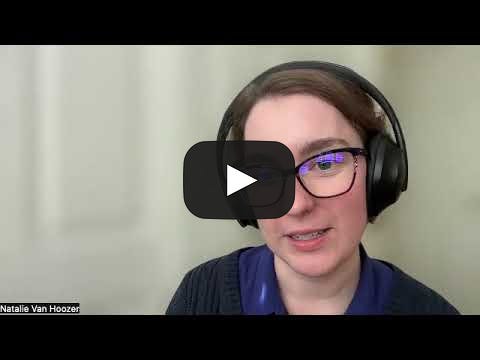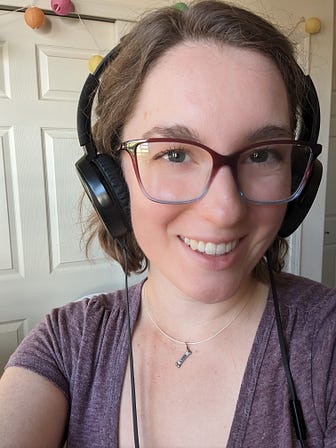You’re reading the My News Biz newsletter, which I will be sending you every other Thursday. My goal is to help you and other digital media entrepreneurs to find a viable business model that works for you. If you were forwarded this email, you can sign up here. A journalist creates her own career path, Part 2You don't need to master all the technology; learn what you need, build your brandYou’re reading the Your News Biz newsletter. My goal is to help digital media entrepreneurs find viable business models. In our last post, Natalie Van Hoozer described all the different jobs she’s had in the years since she graduated from journalism school — and how it helped her in her career. In this post we’ll talk about:
I’ve edited our conversation for length and clarity. All boldface emphasis in the text is mine.— James Breiner Technology skills neededJames: For people who are trying to figure out what they need to learn about digital media technology to advance in their career, what would you tell them about your own experience? Natalie: I think I would define myself as a troubleshooter. So I am the person who loves to try technology and do a test run and find people to answer my questions, and that's how I've pretty much developed a multimedia skill set, including a lot of work virtually. But pre-pandemic, I really looked at how to do video as well as audio and photography with my work, and I would find those very generous classmates or professors who would take the time to go through things that I didn't understand well. But I was determined to do it on my own. When the pandemic hit, a lot of my work, especially with the radio station, ended up being streamed, such as Facebook Live Events in Spanish to inform the community about different things related to COVID, whether it was vaccinations or schools reopening. And my team and I had to figure out how to do those live streams ourselves, how to test it when we were all working remotely in that lockdown phase. So I've figured out a lot of technology things the hard way, but just giving myself plenty of time to test it out, watch recorded online classes, things like that. What about video?James: You mentioned video, and of course that's the big rage right now. Are you going to try to produce LION’s stuff for TikTok or YouTube? Natalie: We are looking at how it makes sense for us to get more into that space. We’re strategizing on what we can record in person when we have things like our conference for the year. James: A lot of people think you have to have a big expensive studio and lighting and so forth. What about your experience with that? Natalie: I definitely have gone the low-tech route. Coming from radio, I know the importance of having high-quality audio with video. If your audio is low quality, then the video can only be so good. And with the videos themselves, you know you need a certain quality of recording device, of camera lenses. But a lot of the time it just comes down to your setup and making sure you have really good lighting, and a lot of that can just be from natural light. So I've always erred on the side of being minimalist, just making sure that I've got those fundamentals down. James: So what's in your bag? What do you take with you when you go out on an assignment? Natalie: If I'm recording video, it's been on my phone or my laptop. I have a pretty decent camera on my laptop. But I make sure that I'm getting that high quality audio by using an external microphone. For radio, I record with a Zoom H4. Better election coverageJames: Talk a bit about technology, building community, and the importance of getting down to the grassroots. Natalie: A lot of my work in the past four or five years has been how to do better election reporting. It was to get away from horse race coverage. We're reporting on election topics and creating voter guides based on what community members need to know or have questions about. So it really informed me now going into my new role as the community manager at LION, applying all those same ideas. Now, how do we listen first? How do we get community members answering each other's questions, media publishers answering each other's questions? How do we build that sense so that people have that trust and they come back to us? Find a nicheJames: And what you say also indicates a change in the way that local news media need to be looking at their news agenda vs. the news agenda that comes from Washington, New York, Los Angeles, Hollywood, those media centers. Everybody is writing the same stuff, about the same people, the same events. And one of the things that I was encouraging, and not only among students, but among independent media generally, is to find a niche that nobody else is paying attention to, but that you can really cover in depth. Build a community that's either based on a shared geographical interest, shared political interest of that particular community or shared thematically. One group of students I had in Spain put together basically a young people's version of what's going on in Europe right now with trade or tariffs or immigration. Here’s what we're hearing from the major media, but we want to know about this, this, and this. How does it affect us? How does it affect our careers? How does it affect our social lives? How does it affect our ability to move across borders and get jobs? and so forth. What about a full-time job?James: This is a topic that always embarrasses people — money. Have you ever been in a position where you were offered a job and you turned it down because it wasn't enough money? Natalie: In the last four or five years, being independently employed, the decision that I made multiple times was to keep working with a portfolio style contract model, as opposed to going with one full-time job. I found that the mixture of things that I was doing I found more enjoyable. With the diversity of clients, in a way, I ended up being more stable. I had friends who were laid off from their one full-time job, whereas if you have four or five steady clients, if something happens to one of them, then you're still moving right along. Build your brandJames: Well, Natalie, thank you very much for sharing all your insights. Is there anything else you would like to add? Natalie: I think just the last thing is building your brand as a journalist can also be something that you start sooner rather than later. Make sure to bring visibility to the work that you're doing, take the time to write those posts, whether it's for LinkedIn or other social media, and share what you're working on. Journalists are telling other people's stories, but when it comes to telling their own stories, sometimes they don't give that as much attention as they probably should. So I've done classes on how to write the “About Us” page of your digital portfolio, your website. Just really take the time to tell your own story on your social media and build your own brand. James: I had that on my list of things to talk with you about, and I'd forgotten, so I'm glad you reminded me. Well, thank you very much, Natalie. I know you're very busy. So it's been a pleasure to talk with you again. Natalie: And thank you for having me. It's been fun. +++++ Below is the complete interview with Natalie, with subtitles.  +++++
+++++ Invite your friends and earn rewardsIf you enjoy Your News Biz, share it with your friends and earn rewards when they subscribe. |
EL PERIÓDICO DE LOS PERIÓDICOS. SOMOS NOTICIAS. Para publicar, contactar: aliazon.comercialyventas@gmail.com
Páginas
- Inicio
- NACIONAL ESPAÑA
- INTERNACIONAL
- BOLETINES DIARIOS
- PORTADAS
- SOCIEDAD
- POLÍTICA
- SECCIONES
- ARTÍCULOS
- ECONOMÍA
- CULTURA
- NOTICIAS TURISMO
- PERIODISTAS
- REVISTAS
- NOTICIERO
- HEMEROTECAS
- REDES SOCIALES
- EVENTOS
- CLIMA
- PUBLICIDAD
- MENÚ
- COMUNICADOS DE PRENSA
- BOLETINES INFORMATIVOS
- MUNDO RURAL
- FEMINISMO
- GASTRONOMÍA
- EMPRESAS
- EL TIEMPO
- RADIO Y TELEVISIÓN
- CIENCIA
- MOTOR
- CONSUMO
- EDUCACIÓN
- TOROS
- OPINIÓN
- BLOGS
- ELECCIONES
- PODCASTS
- PASATIEMPOS
- NEWSLETTERS
- EMPLEO
- SERVICIOS
- SALUD
- ARTE
- BELLEZA
- LIBROS
- NEGOCIOS
- MEDIO AMBIENTE
- TECNOLOGÍA
- LOTERÍAS Y JUEGOS
- MODA
- OTROS
- HORÓSCOPO
- LIFESTYLE
jueves, 13 de marzo de 2025
A journalist creates her own career path, Part 2
Suscribirse a:
Enviar comentarios (Atom)
ARTÍCULOS
¿Tienes información sobre alguna noticia interesante? aliazon.comercialyventas@gmail.com
ROPA Y COMPLEMENTOS ALIAZON
ROPA Y COMPLEMENTOS
OPINIÓN

Opinión y análisis // Diariocrítico.com
Artículos de Opinión | El Independiente
RSS de noticias de opinion
OPINION EL CONFIDENCIAL
Estrella Digital :: Últimas opiniones
Nuevatribuna :: Últimas opiniones
OPINIÓN-KHAMENEI
ÚLTIMAS NOTICIAS

ÚLTIMAS NOTICIAS
Últimas noticias // Diariocrítico.com
Estrella Digital :: Últimas noticias
Comentarios en: Últimas noticias
RSS de noticias de ultima-hora
PORTADAS
RSS de noticias de portada
NACIONAL ESPAÑA

Noticias nacionales | Diariocritico // Diariocrítico.com
MUNDO-KHAMENEI
CULTURA
ARTE
Arte y Cultura // Diariocrítico.com
TEATRO
Salud y vida saludable // Diariocrítico.com
SEXUALIDAD
Sexualidad y salud sexual y para disfrutar de las relaciones en pareja // Diariocrítico.com
SALUD
HISTORIA
Canal Historia // Diariocrítico.com
TURISMO
SOCIEDAD

Sociedad EL CONFIDENCIAL
LIFESTYLE
Estilo Hombre
MODA
CRÓNICA ROSA
Noticias del Corazón // Diariocrítico.com
LO MÁS LEÍDO
Lo más leido de la semana // Diariocrítico.com
CIENCIA
LIBROS
Noticias de libros, editoriales, autores y premios literarios // Diariocrítico.com
ECONOMÍA

Economía-EL CONFIDENCIAL
La actualidad económica en vivo - France 24
RSS de noticias de economia
COMENTARIOS DE ECONOMÍA
Comentarios de la Economía // Diariocrítico.com
Noticias economicas | Diariocritico // Diariocrítico.com
MERCADOS

Mercados - EL CONFIDENCIAL
EMPRESAS

Empresas - EL CONFIDENCIAL
FINANZAS






No hay comentarios:
Publicar un comentario